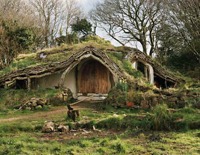Difference between revisions of "Self-sufficiency"
m (Text replacement - "http://" to "https://") |
|||
| Line 1: | Line 1: | ||
[[File:lighterstill.jpg]][[File:Self_Sufficient.jpg|right|frame]] | [[File:lighterstill.jpg]][[File:Self_Sufficient.jpg|right|frame]] | ||
| − | *[ | + | *[https://en.wikipedia.org/wiki/16th_century 1592] |
==Definitions== | ==Definitions== | ||
| − | *1:needing no outside help in [[satisfying]] one's basic [Necessity|needs]], especially with regard to the production of [[food]]: I don't [[think]] [ | + | *1:needing no outside help in [[satisfying]] one's basic [Necessity|needs]], especially with regard to the production of [[food]]: I don't [[think]] [https://en.wikipedia.org/wiki/Botswana Botswana], due to the [[climate]], could ever be self-sufficient in food. |
*2:[[emotionally]] and [[intellectually]] [[independent]]: their son was a little bit of a loner and very ''self-sufficient''. | *2:[[emotionally]] and [[intellectually]] [[independent]]: their son was a little bit of a loner and very ''self-sufficient''. | ||
==Description== | ==Description== | ||
| − | '''Self-sufficiency''' (also called ''self-containment'') is the state of not requiring any aid, [[support]], or [[interaction]], for [[survival]]; it is therefore a type of [[personal]] or [[collective]] [[autonomy]]. On a national scale, a totally self-sufficient [[economy]] that does not trade with the outside world is called an [ | + | '''Self-sufficiency''' (also called ''self-containment'') is the state of not requiring any aid, [[support]], or [[interaction]], for [[survival]]; it is therefore a type of [[personal]] or [[collective]] [[autonomy]]. On a national scale, a totally self-sufficient [[economy]] that does not trade with the outside world is called an [https://en.wikipedia.org/wiki/Autarky autarky]. |
| − | The term ''self-sufficiency'' is usually applied to varieties of [[sustainable]] living in which nothing is consumed outside of what is produced by the self-sufficient [[individuals]]. Examples of attempts at self-sufficiency in North America include [[simple]] living, [ | + | The term ''self-sufficiency'' is usually applied to varieties of [[sustainable]] living in which nothing is consumed outside of what is produced by the self-sufficient [[individuals]]. Examples of attempts at self-sufficiency in North America include [[simple]] living, [https://en.wikipedia.org/wiki/Homesteading homesteading], [https://en.wikipedia.org/wiki/Off-the-grid off-the-grid], [https://en.wikipedia.org/wiki/Survivalism survivalism], DIY ethic and the [https://en.wikipedia.org/wiki/Back-to-the-land_movement back-to-the-land movement]. |
| − | [[Practices]] that enable or aid self-sufficiency include autonomous building, [ | + | [[Practices]] that enable or aid self-sufficiency include autonomous building, [https://en.wikipedia.org/wiki/Permaculture permaculture], [https://en.wikipedia.org/wiki/Sustainable_agriculture sustainable agriculture], and [https://en.wikipedia.org/wiki/Renewable_energy renewable energy]. |
The term is also applied to limited forms of self-sufficiency, for example growing one's own [[food]] or becoming economically [[independent]] of state subsidies. | The term is also applied to limited forms of self-sufficiency, for example growing one's own [[food]] or becoming economically [[independent]] of state subsidies. | ||
Latest revision as of 02:37, 13 December 2020
Definitions
- 1:needing no outside help in satisfying one's basic [Necessity|needs]], especially with regard to the production of food: I don't think Botswana, due to the climate, could ever be self-sufficient in food.
- 2:emotionally and intellectually independent: their son was a little bit of a loner and very self-sufficient.
Description
Self-sufficiency (also called self-containment) is the state of not requiring any aid, support, or interaction, for survival; it is therefore a type of personal or collective autonomy. On a national scale, a totally self-sufficient economy that does not trade with the outside world is called an autarky.
The term self-sufficiency is usually applied to varieties of sustainable living in which nothing is consumed outside of what is produced by the self-sufficient individuals. Examples of attempts at self-sufficiency in North America include simple living, homesteading, off-the-grid, survivalism, DIY ethic and the back-to-the-land movement.
Practices that enable or aid self-sufficiency include autonomous building, permaculture, sustainable agriculture, and renewable energy.
The term is also applied to limited forms of self-sufficiency, for example growing one's own food or becoming economically independent of state subsidies.
The entire human population of the world was, at one time, self-sufficient. Families and groups made their own clothing, tools, weapons, boats and huts. They used gathering, hunting, herding and farming to find/hunt/grow their own food. As the population of the world grew, the wild food supply dwindled. People began to specialise, and to rely on herding and farming more; relying less upon gathering and hunting. In modern times, many farmers produce food on specialised farms. A large part of the worlds population now depends on these farmers to make their food for them. Many in developed nations now depend on job salaries to buy food, clothes, and shelter, rather than making these things from raw materials found in the environment. There are still societies which continue to be self-sufficient, never having given up traditional ways of food gathering and food making. If these people have no jobs and make no salaries, then they are often listed as unemployed.
